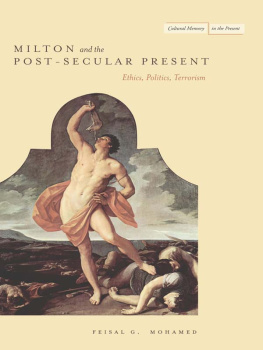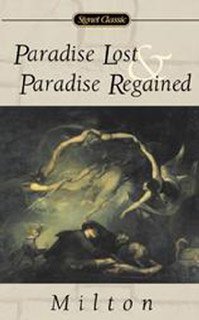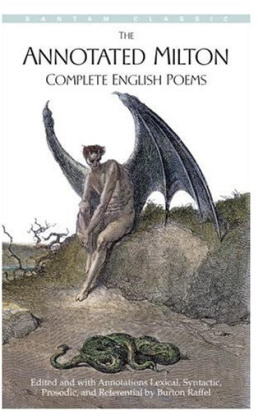Milton John - Areopagitica and Other Prose Works
Here you can read online Milton John - Areopagitica and Other Prose Works full text of the book (entire story) in english for free. Download pdf and epub, get meaning, cover and reviews about this ebook. City: Mineola;NY, year: 2016, publisher: Dover Publications, genre: Science. Description of the work, (preface) as well as reviews are available. Best literature library LitArk.com created for fans of good reading and offers a wide selection of genres:
Romance novel
Science fiction
Adventure
Detective
Science
History
Home and family
Prose
Art
Politics
Computer
Non-fiction
Religion
Business
Children
Humor
Choose a favorite category and find really read worthwhile books. Enjoy immersion in the world of imagination, feel the emotions of the characters or learn something new for yourself, make an fascinating discovery.

- Book:Areopagitica and Other Prose Works
- Author:
- Publisher:Dover Publications
- Genre:
- Year:2016
- City:Mineola;NY
- Rating:4 / 5
- Favourites:Add to favourites
- Your mark:
- 80
- 1
- 2
- 3
- 4
- 5
Areopagitica and Other Prose Works: summary, description and annotation
We offer to read an annotation, description, summary or preface (depends on what the author of the book "Areopagitica and Other Prose Works" wrote himself). If you haven't found the necessary information about the book — write in the comments, we will try to find it.
Areopagitica and Other Prose Works — read online for free the complete book (whole text) full work
Below is the text of the book, divided by pages. System saving the place of the last page read, allows you to conveniently read the book "Areopagitica and Other Prose Works" online for free, without having to search again every time where you left off. Put a bookmark, and you can go to the page where you finished reading at any time.
Font size:
Interval:
Bookmark:

DOVER THRIFT EDITIONS
GENERAL EDITOR: SUSAN L. RATTINER
EDITOR OF THIS VOLUME: JIM MILLER
Bibliographical Note
Areopagitica and Other Prose Works, first published by Dover Publications, Inc., in 2016, is an unabridged republication of selections from Areopagitica and Other Prose Works of John Milton, originally published in 1927 by J. M. Dent & Sons Ltd., London, and E. P. Dutton & Co., New York. The Introduction by C. E. Vaughan is also included.
International Standard Book Number
ISBN-13: 978-0-486-81125-3
ISBN-10: 0-486-81125-5
Manufactured in the United States by RR Donnelley
81125501 2016
www.doverpublications.com
Contents
Introduction
THE AREOPAGITICA WAS published in November 1644. Its immediate occasion was the order of June 1643, by which Parliament re-established the censorship of the Press. Miltons main object is to show the absurdity and iniquity of this measure, and to press for its repeal. But he does not confine himself within these comparatively narrow limits. Again and again, particularly in the latter part of the treatise, he deliberately breaks through them, to prove that freedom of speech and freedom of action are not evils to be tolerated, but blessings essential to the life and progress of any nation.
Thus the Areopagitica falls into its place among the other prose writings of Milton. Like them, it assails the principle of authority and tradition; like them, it is based on the principle, Above all things, Liberty. To plead the cause of freedom was, as he himself says, the sole aim of all he wrote during the twenty years that followed the meeting of the Long Parliament. The form of the plea differs, but its principle is always the same. In one group of writings, it is for political freedom that he fights; in another, for the right to revise the moral and social code, current at any stage of human progress; in a third, he calls on the nation to establish a freer form of ecclesiastical government. And here, in the Areopagitica, he passes behind all these questions to that which lies at the root of all; and pleads that without freedomwithout the liberty to reject, to choose and, where need is, to innovatethere can be no health in the moral and intellectual life either of the individual or the nation.
Hence the Areopagitica is something much more than a mere member of a series. It supplies the principle without which the other, and more special, arguments would have but little value; it lays the foundation upon which, in the last resort, the others rest. Give me the liberty, Milton writes, to know, to utter, and to argue freely, according to conscience, above all liberties.
In urging this plea, Milton, as has been said, takes both the narrower and the wider ground. On the narrower question, the duty of the State towards the Press, there should be no censorship, he argues, before publication; and after publication, no punishment save on the legally proved counts of libel or blasphemy. With these two exceptions, the former of which, at any rate, is recognised no less in our own day than in Miltons, the Press should be absolutely free. Free, because restriction, even the most unsparing, is powerless to check many, and those the most dangerous, abuses. Free, because it is a barrier to learning and an insult to the individual author. Free, because it is a system first devised by the Papacy and the Inquisition, and therefore justly hateful to all high-minded and truth-loving men.
But it is when he comes to the wider and the higher ground that Milton rises to his full strength. What is it, he asks, that makes all restrictions upon the freedom of thought, and therefore of the Press, so unwise and so harmful? It is because freedom of thought and utterance is the first condition of individual rectitude and of national progress. And this is true no less in the world of action than in that of speculative thought. No man can be sure that he has found the truth, until he has compared it with all possible forms of error. No man can be sure that his will is firmly set towards the good, until he has gone forth into the battle and proved his armour against all possible forms of evil. It is the same in conduct as it is in speculation. In both, the individual soul is responsible; in neither can it shuffle off its responsibility upon the infallibility or the authority of others. It is the individual reason, the individual will, that alone counts; and the essence of both is individual choice and individual decision. Destroy these, and we have destroyed the one thing that gives value to the trust of life we have received from God; we have struck at that which makes the very being of the soul; we have killed will and reason as it were in the eye.
So also with the life of the nation. That life does not consist in obedience to any code, however unquestioned, nor in the acceptance of any creed, however venerable. It lies in the sum of moral and spiritual activity to be found in the whole body of the people. In the first instance this is the activity of the individual citizens. But there could be no greater mistake than to suppose that Milton stops short with that view of the matter. No man could have been less ready to regard the individual as an isolated unit; no man could have laid greater stress on the collective life of the nation, or have breathed into it a fuller meaning.
That without unity there can be no such thing as national life, is manifest. The only question is, of what sort that unity is to be. Is it to be imposed artificially from above, or to spring as a natural growth, by its own law, from beneath? In the former case, Milton urges, we shall have a false unity, the unity of death. It is only by accepting the latter principle, and accepting it unflinchingly, that we can hope to win the true unity, the unity of life. By the one method we shall never rise beyond a rigid external formality, a stark and dead congealment of wood and hay and stubble. By the other, if we could but lay aside our intolerance, if we could but find among us the bond of peace, we shall, through all these neighbouring differences, or rather indifferences, attain to the highest unity which man is capable of reaching, the unity of the spirit; we shall find ourselves grown into a knowing people, a nation of prophets, of sages and of worthies. Our perfection, as the perfection of human brotherhood always must, will consist in this, that out of many moderate varieties and brotherly dissimilitudes, that are not vastly disproportional, arises the goodly and the graceful symmetry that commends the whole pile and structure. Now, as always, the true life of a nation is to be sought not in uniformity but in harmonya harmony of differences.
This, however, is not all. In the life of a nation, yet more than in that of the individual, we have to think not only of the present but of the future. The men of one generation can never look at truth with the same eyes as their fathers. The world changes; the field of knowledge and of action widens; and we, if we will be true to our trust, must enlarge our outlook in response. In one age the change will be more rapid, in another less. But, quick or slow, it is always going forward. Progress is inevitable, and it is for our health. Were it to cease, all that is worthy to be called life would cease with it; we should sicken into a muddy pool of conformity and tradition. And without freedomthe liberty to know, to utter and to argue freelyprogress, like life itself, would be impossible to a nation.
In Miltons day the progress offered to men lay especially in the field of religious and moral thought. The task of that generation was to carry forward the work begun by Wyclif and Luther: it went to the reforming of Reformation itself. In this task Milton took a larger and more fruitful share than any of his contemporaries. He did not content himself with pleading for this or that particular doctrine; but, with irresistible reasoning and splendid eloquence, he defended the principle, then regarded by most men as abominable, on which all of them depend. With undaunted courage he put the previous question, that which must be solved before any special reform, particularly on matters of faith and conduct, can gain a hearing. And, once for all, he answered it. From the moment the
Next pageFont size:
Interval:
Bookmark:
Similar books «Areopagitica and Other Prose Works»
Look at similar books to Areopagitica and Other Prose Works. We have selected literature similar in name and meaning in the hope of providing readers with more options to find new, interesting, not yet read works.
Discussion, reviews of the book Areopagitica and Other Prose Works and just readers' own opinions. Leave your comments, write what you think about the work, its meaning or the main characters. Specify what exactly you liked and what you didn't like, and why you think so.






